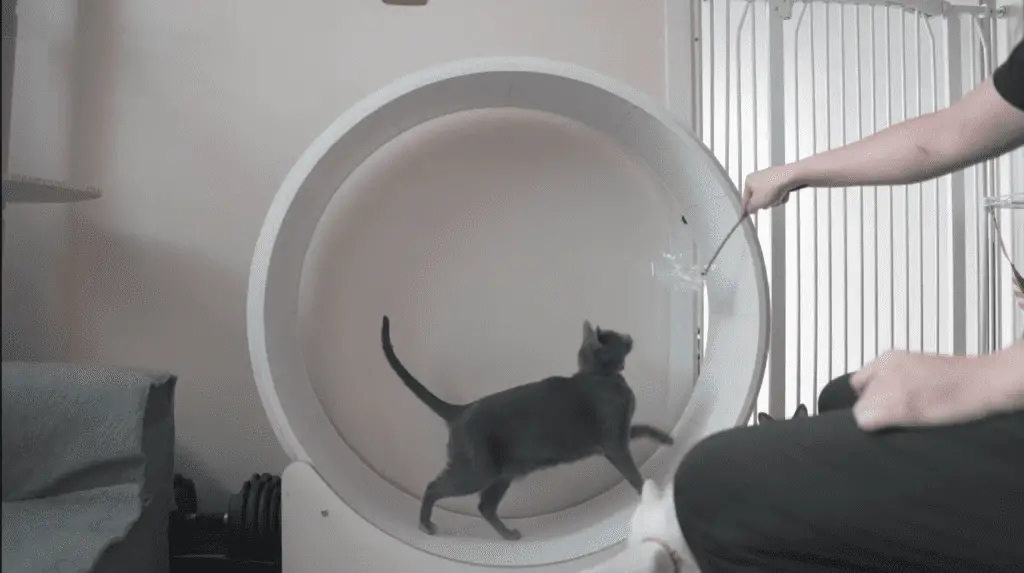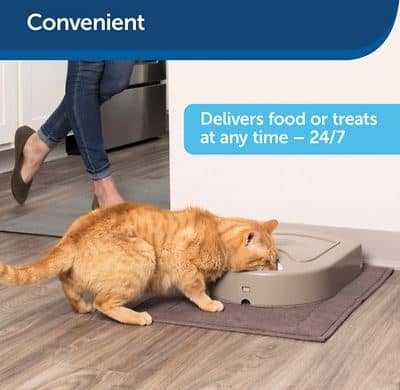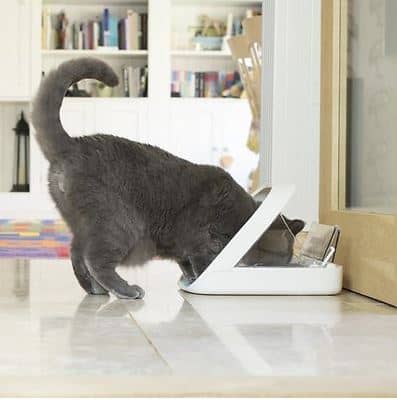For those that are short on time, how long can you leave your cat(s) alone in an apartment? In general, adult cats (1 year+) can be left alone for about 24-48 hours or about 1-2 days maximum. On the other hand, young kittens shouldn’t be left alone for longer than 12 hours since they need a lot of attention. For a more detailed chart, see below!
Sometimes we all need a bit of a vacation and time away from the house or apartment. Luckily, cats will more than likely be fine for short periods of your absence!

Whether your cats live in apartments or houses, there is more potential for accidents to happen the longer you are gone. It’s especially more true in a smaller living area such as an apartment since cats have more reach to get to objects, appliances, and other loose items that they shouldn’t be interacting with.
Leaving Your Cat(s) Alone: Helpful Chart
How long you can leave your cat alone is highly dependent on how old they are. Here’s a helpful chart:
| Cat Age | Maximum Cat Alone Time |
|---|---|
| Young Kittens (Under 6 months) | 4-6 hours |
| Kittens (6 – 12 months) | 8-12 hours |
| Young Adults (1 – 2 years) | 24 hours (1 day) |
| Mature Adults (2+ years) | 48 hours (2 days) |
| Senior Cats (10+ years) | 24 hours (1 day) |
For kittens, this is a sensitive time period as they’re developing, curious, and playful. While a lot of fun, it’s also a recipe for disaster. Therefore, kittens can’t be left alone for too long. Super young kittens need to be fed properly and kittens from 6-12 months are too playful and energetic to leave on their own for too long!
For adult cats, It’s best to cap out excursions at 2 days (or 48 hours) to make sure they don’t get up to any trouble while you’re away. Although cat owners might have many toys, cats get bored quickly, and bored cats have a higher risk of developing behavior/health problems.
Some senior cats can be sensitive to changes, and thus, the stress associated with being left alone can lead to illness. If the senior cats have health problems, cat owners should avoid being away for longer than 12 hours.

Before you leave for an extended amount of time (for over a day), It’s a good idea to start slow and see how your cats will react with you gone. Then, slowly increase the time. First, start with one day and then maybe next time, go a day and a half. Then finally, try 2 days. Some cats can also display separation anxiety (lack of appetite, vocalization, and/or destructive behaviors)!
Gender plays a factor too, male and female cats have different levels of independence and attention needs.
What To Do When You Need to Leave For Longer?
If you know you’ll be gone for a longer period of time (2+ days) or have to leave your cats alone frequently:
- Have someone come and check up on the cats, clean the litter box, and refill their food and water if need be.
- For more sensitive cats or kittens, it’s a good idea to get a trusted friend, family member, or a reputable cat-sitter to look after the cats while you’re away.
- Invest in some tools (see the recommended products section below) to make sure that your cats are getting the right amount of food and water while you’re away.
What to Expect When Leaving Your Cat(s) Alone
It’s hard to anticipate what they might do or what trouble they might get up to while you’re away, especially with more active breeds that need attention, such as my Bengal. Sometimes when I leave for too long, he starts going on adventures inside the drawers and cupboards, and he would drag everything out.
Most of the time, it’s harmless, but there was a time in which he got into the cat snack drawer and dragged it out for the rest of the cats to have a party. Needless to say, it made a huge mess, and I had to spend extra time cleaning up when I got home. So prepare yourself beforehand (see the checklist below) avoid extra cleaning when you get home.
It’s also important to mention that leaving for too long or too often can have an effect on your relationship with your cat(s). Cats are social creatures and they enjoy human interaction.
In a 2013 study conducted by the Oregon State University, researchers discovered that domestic cats prefer social interactions with humans followed by food. This implies that cats are social and crave attention like most living things! As such, cat owners should try to spend meaningful time with their cats and avoid leaving their cats alone too often.
What to Prepare Checklist When Leaving Your Cat(s) Alone
1. Have Enough Food and Water
Most people think about just having enough food and water. However, remember that food and water get stale. So having a fountain helps a lot with the water situation.
What about the food? That can also be made easier with automatic food dispensers. Fountains and food dispensers can usually contain 2-3 days’ worth of supplies before you need to refill them again.
Of course, these items are not necessary. If you have been feeding your cats on a schedule and sort of know how much your cats eat per day. Give them an extra day or two worth of food. This is because you cannot predict how much they might eat when left alone. So it’s best to have more food available than too little.
Another hack for water is to have a bowl under the faucet in the kitchen sink. Have it on a slow drip, so it doesn’t fill up too fast but not too slow either. This way, if you’re in a pinch and worried if the water is going to last, you know for sure that they’ll at least have enough water to drink while you’re away.
2. Prepare Play and Distractions
Cats, when left alone, get bored. Bored cats tend to start looking for their own fun. If their newfound fun is knocking over one of your valuables and batting it around, this is a problem.
So definitely have some different types of toys available. I also like to sometimes leave the TV on with some bird videos online on a loop if they do not have access to a window.

The longer they are preoccupied and distracted with something, the less they realize that you’re gone. Remember, cats like to hunt and forage. So don’t just leave all the toys on the floor. Leave them in different positions and places for them to discover as they roam around the room.
Do the same for snacks. In addition to the food there, I spread snacks around the room or on their cat furniture. For example, onto the scratching post, window perch, and sofa. Anything to distract them and get their mind engaged while you’re away.
3. Have an Extra Litter Box
The last thing to prepare is the litter box. The longer you are away, the more boxes you might need. The reason for this is because as the litter box or boxes fill up, cats start to look for cleaner places (in smell and appearance) to eliminate.
More litter boxes allow you some extra time before they completely refuse to use the litter box. If one litter box is dirty, they’ll use the other one. If you have more than one cat, they’ll often share the litter box. Check out my litter box guide here (how many litter boxes do you need?).
The extra litter box can be a cardboard box. It makes it simple to clean up and throw away when you get back. Also, it’s a good idea to place the litter box away from the current litter boxes that you have. Keeping the litter boxes apart allows cats to differentiate between the litter box areas. Thus, it’s more likely that cats will eliminate properly in the litter boxes.
Right Before You Leave Checklist
Right before you go out of the house, it’s a good idea to double-check these things:
- The first on the list is to make sure the litter boxes are clean and freshly scooped. You’ll want to make sure that there’s nothing inside it when you leave just in case. Even a bit of waste or pee in there means one pee less until they start eliminating outside the litter box. So I like to clean the litter box and top it off with fresh litter about an hour before I leave.
- Second, tape shut any cabinets or drawers that might contain valuables, extra snacks, or chemicals that could harm your cat. Make sure that they don’t go exploring in there when you’re gone. In the past, one of my cats would open the top drawer when I was gone, and then my Bengal would crawl into the top drawer and figure out a way to go down to the bottom drawer where all the snacks were.
- Third, clear your desk and work area. Anything loose and on your desk is potentially a play object so stash it away in one of the taped cabinets/drawers or place it somewhere out of reach. Bowls, cups, and glasses should also be put away. To get your cats to stay off your desk – for good, read my article here: How to Keep Cats Off Your Desk!
- Last, but not least, make sure that you can see all of your cats before you leave. Make it a habit to say bye to each one of your cats. I’ve had some situations when I left (but luckily for not very long) and one of the cats somehow snuck inside the closet or bathroom and couldn’t get out. So by saying bye, you make sure that they are all where they’re supposed to be.
Recommended Tools and Supplies When Leaving Your Cats Alone
 PETSAFE 5-Meal Automatic Cat & Dog Feeder
PETSAFE 5-Meal Automatic Cat & Dog Feeder
Schedule your pet's meals in advance with the PetSafe Eatwell 5-Meal Timed Pet Feeder. Set the timer, fill the feeder, and when it's time for the next meal the Eatwell Pet Feeder will deliver a perfectly portioned bowl of kibble to your favorite friend. Perfect for weekends away or pet parents with busy schedules.
 DRINKWELL Seascape Ceramic Dog & Cat Fountain
DRINKWELL Seascape Ceramic Dog & Cat Fountain
Bring fresh, running springs home to your pet with the PetSafe Drinkwell Seascape Ceramic Pet Fountain. The low-voltage, submersible pump constantly circulates the water, keeping the water clean while encouraging your pet's hydration by making the water more appealing to them—just like stopping by a fresh river in the wild.
 SureFeed Microchip Cat & Dog Feeder
SureFeed Microchip Cat & Dog Feeder
If you have multiple hungry pals that love smooching off food from each other, get a handle on it! Only opening for a designated pet by picking up on a unique microchip or included RFID collar tag, it’s the perfect way to stop pets from stealing each others’ food. It’s great for pals who are on strict or prescription diets, or those that need to maintain a healthy weight.
Leaving Your Cat(s) Alone: Conclusion
Hopefully, when you’ve returned, your cats are fine, everything is still in one piece, and no smelly surprises are waiting for you. That’s the smell of success.
This might be more of a checklist for me than for you guys, but I believe it will be helpful to other people as well!
